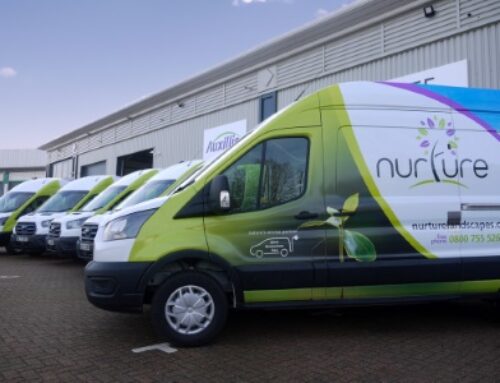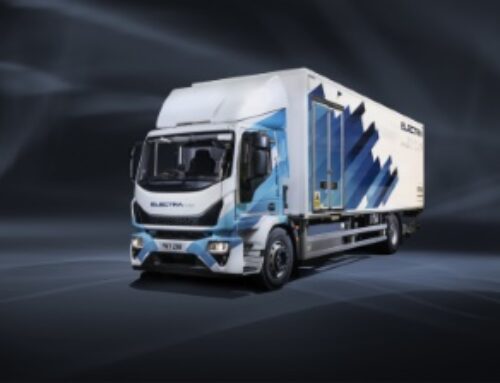Oiling the wheels of decarbonisation
 Tom Hyde, technical support manager for TotalEnergies UK, explains how lubricants can help operators become more carbon-conscious
Tom Hyde, technical support manager for TotalEnergies UK, explains how lubricants can help operators become more carbon-conscious
Road haulage is a critically important global industry. Set to be valued at over $4 billion globally by 2025, the sector has been propelled by economic forces and technological developments – including the exponential expansion of online retail.
But, amid this growth, the industry faces a significant challenge – HGVs and freight transportation are still reliant on carbon-heavy resources. As the UK, alongside other countries, adapt and evolve to meet net zero emissions targets, the haulage sector will likewise need to accelerate its transformation.
Many governments are setting goals for cutting emissions from the transportation sector and proposing incentives to companies that adopt electric vehicles. In the UK, the government’s Transport Decarbonisation Plan (TDP) has laid out a path to achieving net zero emissions across every mode of transport by 2050, including HGVs.
On the other side, there will likely be financial penalties for companies that do not reduce their environmental impact and adapt. These policies can help to level the playing field for companies in the haulage industry, but they will also present challenges for companies unwilling to change, or unprepared to move fast to implement decarbonisation strategies.
Emission-conscious lubricants
Climate change can often seem ‘too big’ of a problem to solve, or the investments required so great that concrete action is kicked down the road. But HGV operators can take small steps today to make more sustainable choices.
 Using fuel-efficient lubricants is essential to the operation and maintenance of fleets looking to become more sustainable – and save money whilst doing so. Becoming carbon-conscious will benefit those looking to capitalise on government incentives and operate more cost-effectively.
Using fuel-efficient lubricants is essential to the operation and maintenance of fleets looking to become more sustainable – and save money whilst doing so. Becoming carbon-conscious will benefit those looking to capitalise on government incentives and operate more cost-effectively.
After all, Freight Link Europe recently noted that the cost of running a single lorry has risen some £20,000 over the past year.
Lower maintenance costs and increased efficiency is possible through the right lubricant choice – by choosing products with reduced friction and viscosity (such as our own Rubia TIR 9900 FE 5W-30), engines can be kept in good working order, for longer.
These efficiency gains provide both emissions reductions and cost control benefits equating to between two and three per cent increases in fuel efficiency for commercial vehicles.
The right lubricant choice can help drive efficiencies, reduce emissions, and improve overall carbon footprint. Historically, lubricants have been seen as a something of a technical detail, but according to TotalEnergies’ research, the right lubricants can deliver five per cent fuel or energy savings across heavy duty machinery and vehicles.
What’s more, choosing the right lubricant partner can support those in the sector by maximising efficiency through technology. Data-driven predictive maintenance, such as predictive analysis and lubrication maintenance software, can increase energy savings by using fuel economy type of lubricants along with specific low friction synthetic lubricants for certain applications. These may also provide improved lubricant lifetime, reducing material usage and waste.
Another step in improving efficiency and sustainability is how the industry disposes and recycles its oils and lubricants. Many waste recycling providers across the UK, such as Slicker, take used oil that would otherwise have been disposed through fuel burning in the marine or energy markets and reprocess it into a base oil product to create new carbon-efficient lubricating oils.
Overall, this emits about 30 per cent less CO2 than lubricants produced from crude oil – reducing environmental impact.
Biodegradable solutions
In line with regulatory requirements, fleet operators are increasingly prioritising products and materials which have strong recycling credentials, and which help comply with waste management and biodiversity/nature protection laws.
This includes the use of biodegradable lubricants and greases in operations. Advances in biochemistry mean that operators can now opt for products that are non-toxic and biodegradable, reducing the carbon footprint of vehicle upkeep.
Choosing lubricants which are fully biodegradable and formulated from renewable raw materials is a quick switch for those looking to be more environmentally conscious.
These products can help reduce engine fuel consumption, while being suitable for use in sensitive environments, such as locations close to rivers, agricultural land, or forests, with the risks associated with accidental leakages minimised.
Many in the industry will be looking at net zero as a future-event and may consider ‘early adopter’ status as a commercial risk – not least given that the successful decarbonisation of road haulage will be dependent on policy decisions with respect to critical infrastructure.
But, by making informed decisions about the products and solutions used to maintain existing fleets near term, incremental improvement is possible and will help the sector lay the groundwork for a successful transition to a decarbonised future.











